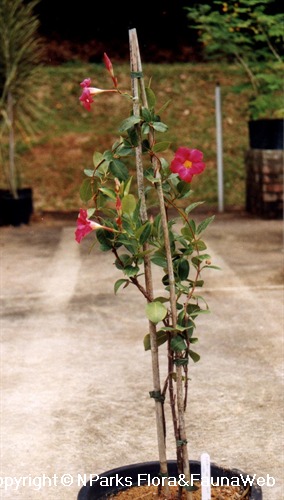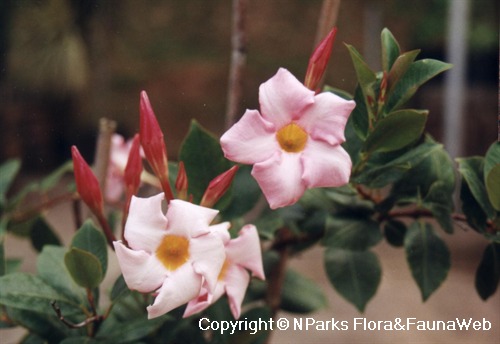.jpg)
Back
Mandevilla sanderi 'Red Riding Hood'
| Family Name: | Apocynaceae |
| Synonyms: | Dipladenia sanderi 'Red Riding Hood' |
Name
Classifications and Characteristics
| Plant Division | Angiosperms (Flowering Seed Plants) |
|---|---|
| Plant Growth Form | Climber |
| Lifespan (in Singapore) | Perennial |
| Mode of Nutrition | Autotrophic |
Biogeography
| Native Distribution | South Brazil |
|---|---|
| Native Habitat | Terrestrial |
| Preferred Climate Zone | Tropical |
| Local Conservation Status | Non-native (Horticultural / Cultivated Only) |
Description and Ethnobotany
| Growth Form | A woody vine that grows up to 2.4 m. |
|---|---|
| Foliage | Leaves are dark green, glossy and shiny. Leaf blade is oval in shape, with acuminate apex and rounded base, with entire margin. Leaves are arranged oppositely along the stems. |
| Flowers | Flowers are deep pink to red in colour; funnel shaped with bright yellow throat,, with 5 spreading petals. They occur singly or in clusters. Flower buds are dark pink to reddish in colour. |
| Cultivation | Plant under full sun with regular watering. Plants can also be planted indoor but with bright light. Pinch the shoots to promote bushiness. Plant requires support to allow climbing. |
| Etymology | The genus Mandevilla is named after Henry John Mandeville, a diplomat in Buenos Aires who introduced Chilean jasmine. The specific epithet sanderi is named after Henry Frederick Conrad Sander and family, nurserymen of St. Albans and Bruges, importers of many new plants. |
Landscaping Features
| Desirable Plant Features | Ornamental Flowers |
|---|---|
| Landscape Uses | Parks & Gardens, Small Gardens, Trellis / Arbour / Pergola, Container Planting, Suitable for Hanging Baskets |
Fauna, Pollination and Dispersal
| Fauna Pollination Dispersal Associated Fauna | Butterfly-Attracting |
|---|
Plant Care and Propagation
| Light Preference | Full Sun |
|---|---|
| Water Preference | Moderate Water |
| Plant Growth Rate | Fast |
| Rootzone Tolerance | Moist Soils, Well-Drained Soils |
| Potential Problems | Mealybugs and aphids. |
| Propagation Method | Division |
Foliar
| Foliage Retention | Evergreen |
|---|---|
| Mature Foliage Colour(s) | Green |
| Mature Foliage Texture(s) | Glossy / Shiny |
| Prominent Young Flush Colour(s) | Green |
| Young Flush Texture(s) | Glossy / Shiny |
| Foliar Type | Simple / Unifoliate |
| Foliar Arrangement Along Stem | Opposite |
| Foliar Attachment to Stem | Petiolate |
| Foliar Shape(s) | Non-Palm Foliage |
| Foliar Venation | Pinnate / Net |
| Foliar Margin | Entire |
| Foliar Apex - Tip | Acute |
| Foliar Base | Rounded / Obtuse |
Floral (Angiosperm)
| Flower Colour(s) | Red, Pink |
|---|---|
| Flower Texture(s) | Smooth |
| Flower Grouping | Solitary, Cluster / Inflorescence |
| Flower Symmetry | Radial |
| Individual Flower Shape | Funnelform / Funnel-shaped |
| Inflorescence Type | Umbel |
| Flowering Period | Free-Flowering |
Image Repository
Others
| Master ID | 151 |
|---|---|
| Species ID | 1447 |
| Flora Disclaimer | The information in this website has been compiled from reliable sources, such as reference works on medicinal plants. It is not a substitute for medical advice or treatment and NParks does not purport to provide any medical advice. Readers should always consult his/her physician before using or consuming a plant for medicinal purposes. |

.jpg)
.jpg)


.jpg)
.jpg)